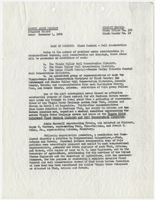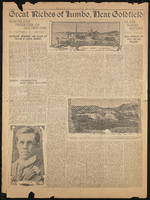Search the Special Collections and Archives Portal
Search Results
Adele Baratz Papers
Identifier
Abstract
The Adele Baratz papers mainly consist of photographs documenting Adele Baratz's life in Las Vegas, Nevada from the 1930s to 2010. An essay and list of names written by Baratz's brother, Charles Salton, document the early history of the Jewish community in Las Vegas.
Archival Collection
Regional subject files, 1859, 1908, 1970-2015
Level of Description
Scope and Contents
The regional subject files include materials collected by anthropologist Katherine Spilde about Native American gaming, Native American communities in the United States, and the US and international gaming industries. The materials date from 1859 to 2015, with the bulk of materials dating from 1990 to 2010. Materials dating from the nineteenth and early twentieth centuries are a reproduction of a federal treaty and an ethnohistorical essay. The majority of the materials document Native American gaming following the passage of the 1988 Indian Gaming Regulatory Act. The papers include research and subject files created by Dr. Spilde during her employment with the National Gambling Impact Study Commission (NGISC), National Indian Gaming Association (NIGA), and Harvard Project on American Indian Economic Development (HPAIED). The materials document Native American gaming enterprises both on and off reservations, the socioeconomic impact of gaming, the political history of gaming in the US, and international gaming. The series includes socioeconomic reports, testimonies, correspondence, memos, press releases, photographs, audiovisual materials, promotional materials, brochures, fact sheets, summaries, booklets, pamphlets, advertisements, tourism materials, journal articles, legal briefs, legislative documents, court opinions, notes, presentations, conference materials, periodicals, community newspapers, and newspaper articles.
The collection contains documentation on a number of Native American nations, including the Misi-zaaga'iganiing Anishinaabeg (Minnesota Chippewa Tribe, Mille Lacs Band); Gaa-waabaabiganikaag Anishinaabeg (Minnesota Chippewa Tribe, White Earth Band); Forest County Bodéwadmi (Forest County Potawatomi Community); Ho-Chunk Nation of Wisconsin; Mashantucket Pequot Indian Tribe; Mohegan Tribe of Indians; Tulalip Tribes of Washington; Sisseton-Wahpeton Oyate of the Lake Traverse Reservation; Standing Rock Sioux Tribe of North and South Dakota; Mandan, Hidatsa, and Sahnish (Arikara) (Three Affiliated Tribes of the Fort Berthold Reservation, North Dakota); and Mississippi Band of Choctaw Indians. Other communities are also represented in the series, but to a lesser extent. In addition to materials about gaming and casinos, Dr. Spilde also collected documents, photographs, and audiovisual materials about Native American culture in general. The series documents regional and national trends in Native American gaming, and the greater gaming industry. Materials trace federal and state relationships with individual Native American nations, specifically concerning gaming enterprises.
Archival Collection
Pagination
- Previous page ‹‹
- Page 2
Archival Component

Arturo Ochoa interview, April 9, 2019: transcript
Date
Archival Collection
Description
On the corner of Eastern and Stewart, inside the East Las Vegas Community Center, lies an oasis of creativity and art. The halls ring with the sound of harmonious music coming from the meeting rooms, where children move violin bows up and down in a synchronized motion. They stare with concentration at the music sheets in front of them. They gracefully play together and fill the empty halls with classical music. For most of them, they are the first in their family to learn how to play an instrument. Like many in their neighborhood, they are also first-generation Americans. The students are rehearsing for their recital with the Las Vegas Philharmonic at the Smith Center in a few weeks. In the back of the room there is a man gleaming with pride and joy. The Foundation to Assist Young Musicians (FAYM) provides the rehearsal space, violins, and music lessons at the community center and allows these children to flourish despite their economic, social, or racial background through, “Building
Text

Transcript from interview with Rabbi Yocheved Mintz by Barbara Tabach, March 11, 2015
Date
Archival Collection
Description
During this oral history, Rabbi Yocheved Mintz weaves the journey of her life before and during her move to Las Vegas. She recalls thinking the "whole world was Jewish" growing up in Cleveland, Ohio, and discusses finding a community in Las Vegas, and becoming a rabbi in 2004.
Yocheved (nee Porath) Mintz is a native of Cleveland, Ohio, where she grew up surrounded by Jewish tradition and teachings. Her grandfather was Rabbi Israel Porath and inspiration to become the family?s first female rabbi. She was ordained in May 2004. The next year she became the second spiritual leader of Valley Outreach Synagogue, now known as P?nai Tikvah. She soon was known as a tireless and inspirational rabbi for the entire Jewish community of Las Vegas. After eleven years, on June 17-18, 2016, Rabbi Mintz?s life and dedication to being Jewish were celebrated. She transitioned to be Rabbi Emerita/Senior Educator. Before moving from Chicago to Las Vegas in 1999 she was abundantly busy with raising four sons she had with her husband the late Dr. Alan Mintz (1938-2007). However, she also managed to pursue her education, become an interior designer, and co-found with her friend Etty Dolgin, a Jewish education consulting firm called Kesher Team. Yet there was a lingering goal to become a rabbi. Throughout her life, Yocheved eagerly studied various approaches to living a Jewish life. So once she had settled into Las Vegas, she began her commute to Los Angeles to study at the Academy for Jewish Religion, a trans-denominational seminary. She interned at Temple Beth Sholom and has been involved in Jewish education locally and nationally. She has served as the first president of the Las Vegas Board of Rabbis and on the Interfaith Council of Southern Nevada.
Text

Pom Fritz oral history interview: transcript
Date
Archival Collection
Description
Oral history interview with Pom Fritz conducted by Kristel Peralta and Stefani Evans on June 8, 2021 for Reflections: The Las Vegas Asian American and Pacific Islander Oral History Project. Pom talks about her family and upbringing in Udon Thani, Thailand and her immigration to the United States with her second husband, an American citizen, in 1972. She discusses living on Air Force bases in North Carolina and California before moving to Las Vegas and finding work at different hotels. Pom shares her experiences as a member, steward, and executive board representative of the Culinary Workers Union and what she recalls from the Frontier Strike. She also talks about her children and grandchildren, some of whom still live in Thailand.
Text

County agent project progress report, Flood control - soil conservation and soil conservation-domestic allotment, November 1, 1939
Date
Archival Collection
Description
Discussion of the formation of the Virgin River Watershed Flood Control District and Soil Conservation Committee and the efforts of all the individual soil conservation districts. Project Number: State Office No. 172. Clark County No. 12 and Project Number: State Office No. 284. Clark County No. 24
Text

Interview with Lafayette "Lafe" H. Dana, June 20, 2005
Date
Archival Collection
Description
Text

Chet Buchanan oral history interview: transcript
Date
Archival Collection
Description
Oral history interview with Chet Buchanan conducted by Barbara Tabach on November 28, 2017 for the Remembering 1 October Oral History Project. Chet Buchanan begins this interview with a discussion of his move to Las Vegas, Nevada in 1999 after he was offered a job as a radio show host for 98.5 KLUC. He talks about the specifics of his job, including his career background as well as the Chet Buchanan Toy Drive. For this interview, he specifically goes into detail on his coverage of the Las Vegas October 2017 mass shooting and discusses being in San Diego, California at the time, yet still striving to reach people through his broadcast with the help of CBS San Diego. Throughout the interview, Buchanan examines his desire to make a difference in the community with his show and his interactions with the public.
Text

Sandra Gray oral history interview: transcript
Date
Archival Collection
Description
Oral history interview with Sandra Gray conducted by Elsa Lopez and Barbara Tabach on December 13, 2019 for the Latinx Voices of Southern Nevada Oral History Project. In this interview, Dr. Gray discusses her family history, and describes how her parents are immigrants from Durango, Mexico and moved from East Los Angeles, California to East Las Vegas, Nevada in 1991. After getting her bachelor's degree in psychology from the University of Nevada, Las Vegas (UNLV) she started a behavioral health agency that provided rehabilitative mental health services to children primarily in the foster care system. She went on to earn a master's degree in mental health counseling, a master's in psychology, and a doctoral degree in clinical psychology. She is the founder of Empower LV, which strives for equitable access to sports and tutoring. Dr. Sandra Gray is also the owner and operator of Innovation Behavioral Health Solutions, LLC.
Text

